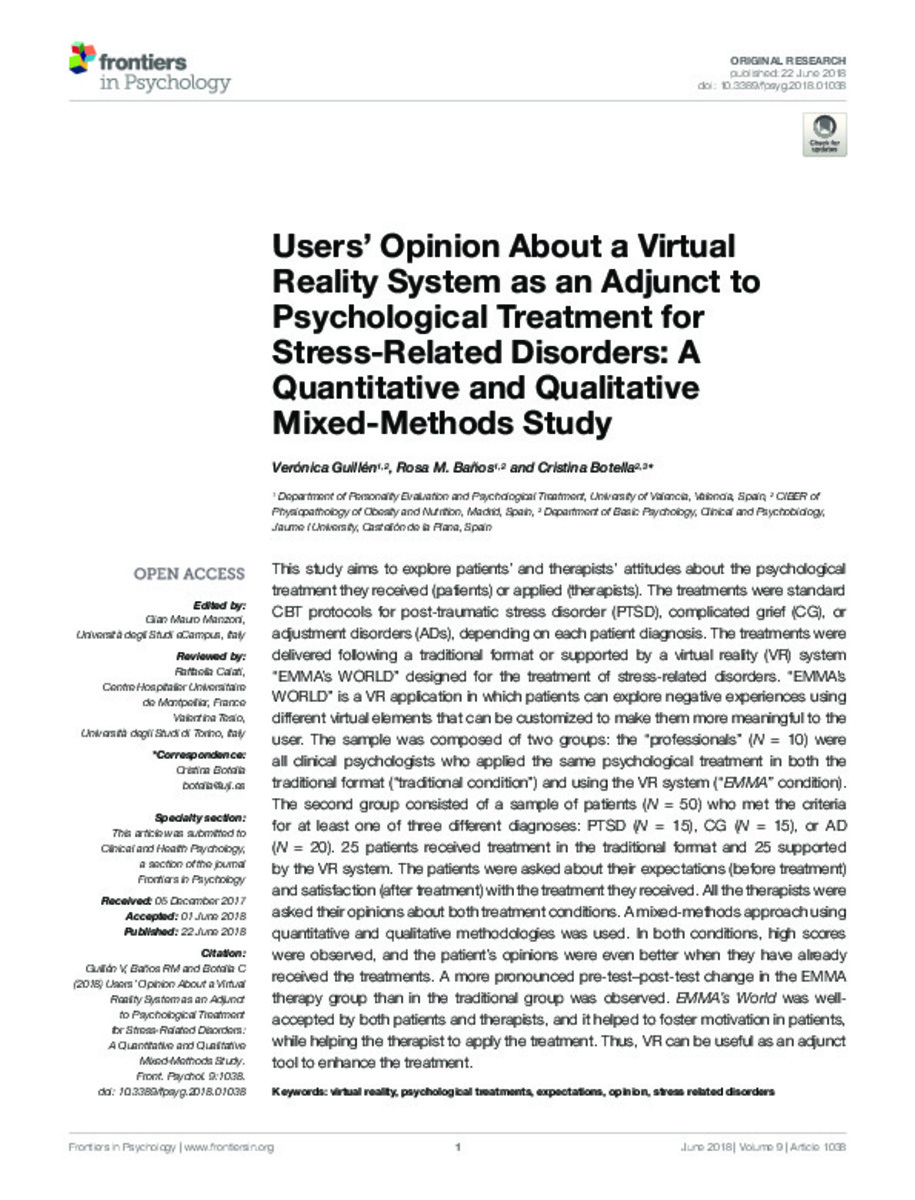Mostrar el registro sencillo del ítem
Users’ Opinion About a Virtual Reality System as an Adjunct to Psychological Treatment for Stress-Related Disorders: A Quantitative and Qualitative Mixed-Methods Study
| dc.contributor.author | Guillen, Veronica | |
| dc.contributor.author | Baños, Rosa Maria | |
| dc.contributor.author | Botella, Cristina | |
| dc.date.accessioned | 2018-09-11T10:18:34Z | |
| dc.date.available | 2018-09-11T10:18:34Z | |
| dc.date.issued | 2018-06 | |
| dc.identifier.citation | GUILLÉN BOTELLA, Verónica; BAÑOS RIVERA, Rosa María; BOTELLA, Cristina (2018). Users’ Opinion About a Virtual Reality System as an Adjunct to Psychological Treatment for Stress-Related Disorders: A Quantitative and Qualitative Mixed-Methods Study. Frontiers in Psychology, v. 9 | ca_CA |
| dc.identifier.uri | http://hdl.handle.net/10234/176031 | |
| dc.description.abstract | This study aims to explore patients’ and therapists’ attitudes about the psychological treatment they received (patients) or applied (therapists). The treatments were standard CBT protocols for post-traumatic stress disorder (PTSD), complicated grief (CG), or adjustment disorders (ADs), depending on each patient diagnosis. The treatments were delivered following a traditional format or supported by a virtual reality (VR) system “EMMA’s WORLD” designed for the treatment of stress-related disorders. “EMMA’s WORLD” is a VR application in which patients can explore negative experiences using different virtual elements that can be customized to make them more meaningful to the user. The sample was composed of two groups: the “professionals” ( N = 10) were all clinical psychologists who applied the same psychological treatment in both the traditional format (“traditional condition”) and using the VR system (“ EMMA” condition). The second group consisted of a sample of patients ( N = 50) who met the criteria for at least one of three different diagnoses: PTSD ( N = 15), CG ( N = 15), or AD ( N = 20). 25 patients received treatment in the traditional format and 25 supported by the VR system. The patients were asked about their expectations (before treatment) and satisfaction (after treatment) with the treatment they received. All the therapists were asked their opinions about both treatment conditions. A mixed-methods approach using quantitative and qualitative methodologies was used. In both conditions, high scores were observed, and the patient’s opinions were even better when they have already received the treatments. A more pronounced pre-test–post-test change in the EMMA therapy group than in the traditional group was observed. EMMA’s World was well- accepted by both patients and therapists, and it helped to foster motivation in patients, while helping the therapist to apply the treatment. Thus, VR can be useful as an adjunct tool to enhance the treatment | ca_CA |
| dc.format.extent | 14 p. | ca_CA |
| dc.format.mimetype | application/pdf | ca_CA |
| dc.language.iso | eng | ca_CA |
| dc.publisher | Frontiers Media | ca_CA |
| dc.relation.isPartOf | Frontiers in Psychology (2018), v. 9 | ca_CA |
| dc.rights | Atribución 4.0 Internacional | * |
| dc.rights.uri | http://creativecommons.org/licenses/by-sa/4.0/ | * |
| dc.subject | Virtual reality | ca_CA |
| dc.subject | Psychological treatments | ca_CA |
| dc.subject | Expectations | ca_CA |
| dc.subject | Opinion | ca_CA |
| dc.title | Users’ Opinion About a Virtual Reality System as an Adjunct to Psychological Treatment for Stress-Related Disorders: A Quantitative and Qualitative Mixed-Methods Study | ca_CA |
| dc.type | info:eu-repo/semantics/article | ca_CA |
| dc.identifier.doi | https://doi.org/10.3389/fpsyg.2018.01038 | |
| dc.relation.projectID | 1) Ministerio Economía y Competitividad, Spain (PSI2014-54172-R), “CIBER of Physiopathology of Obesity and Nutrition, an initiative of ISCIII”; 2) Excellence Research Program PROMETEO (Generalitat Valenciana, Conselleria de Educación, PROMETEOII/2013/003) | ca_CA |
| dc.rights.accessRights | info:eu-repo/semantics/openAccess | ca_CA |
| dc.relation.publisherVersion | https://www.frontiersin.org/articles/10.3389/fpsyg.2018.01038/full | ca_CA |
| dc.type.version | info:eu-repo/semantics/publishedVersion | ca_CA |
Ficheros en el ítem
Este ítem aparece en la(s) siguiente(s) colección(ones)
-
PSB_Articles [1292]
Articles de publicacions periòdiques








